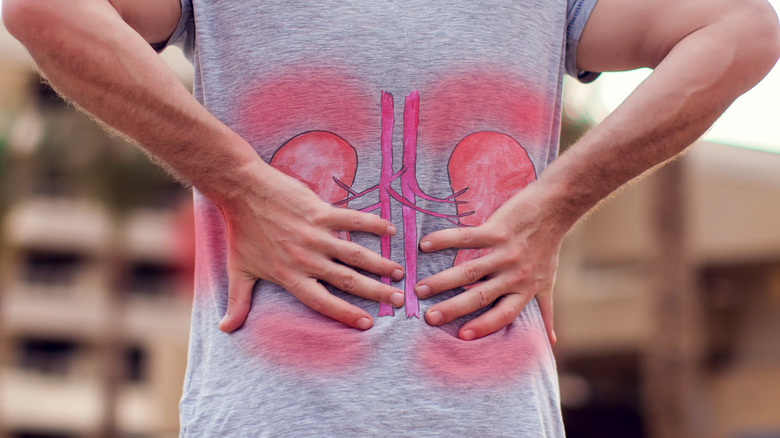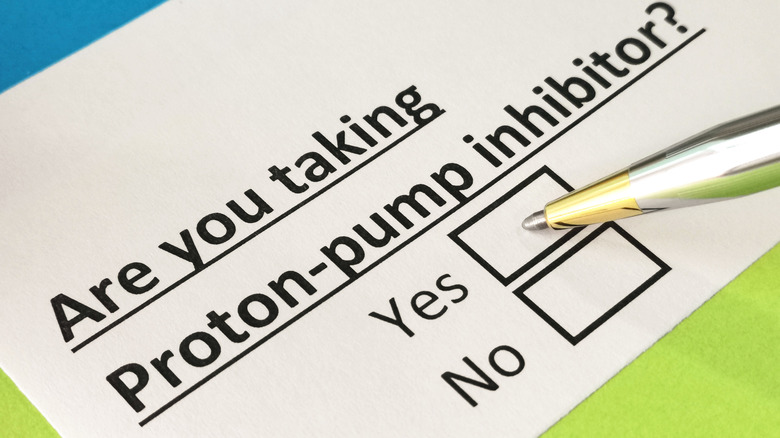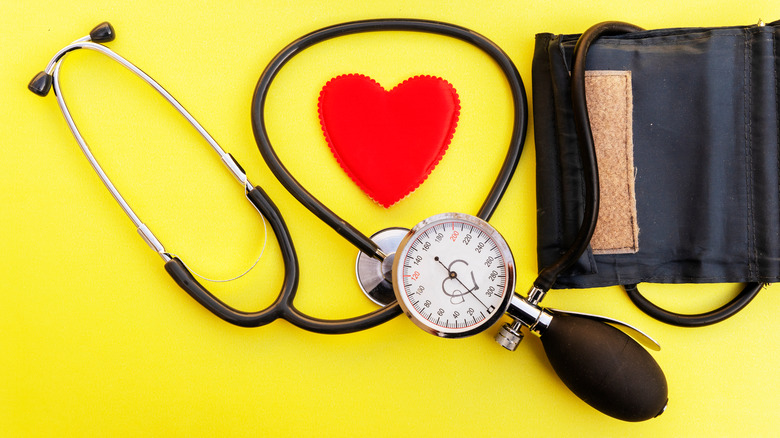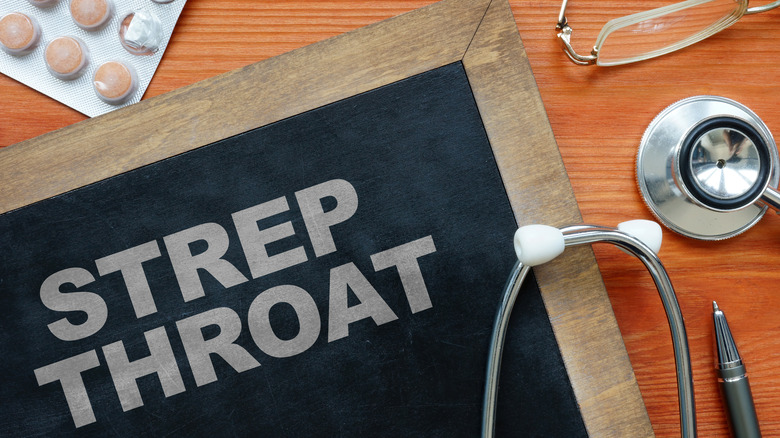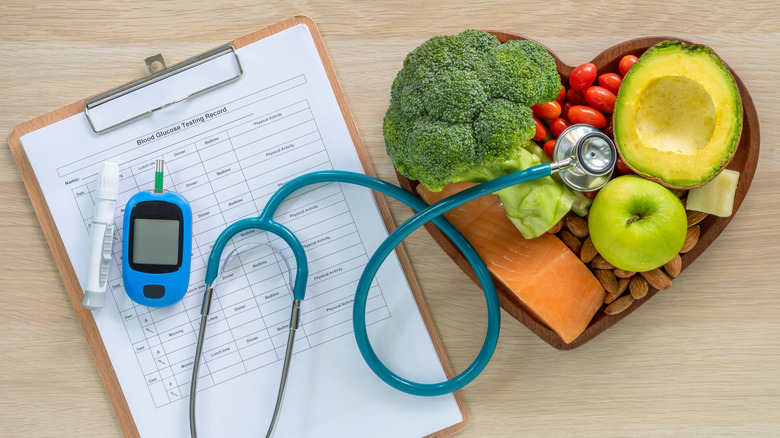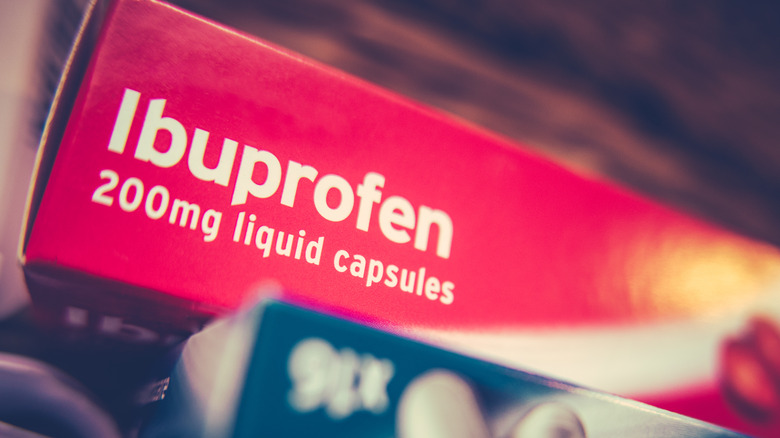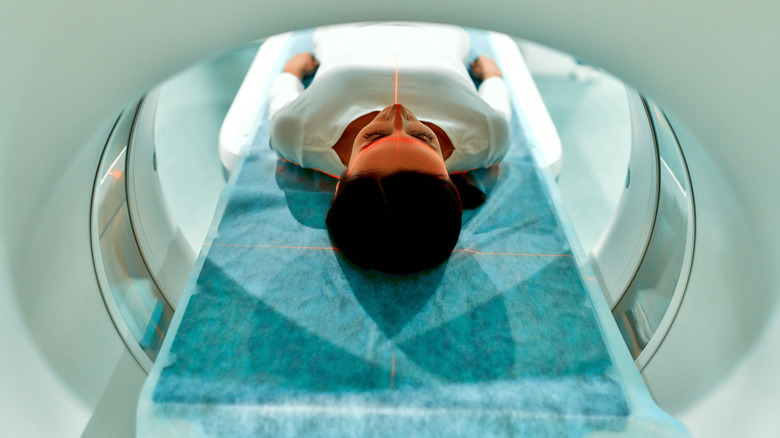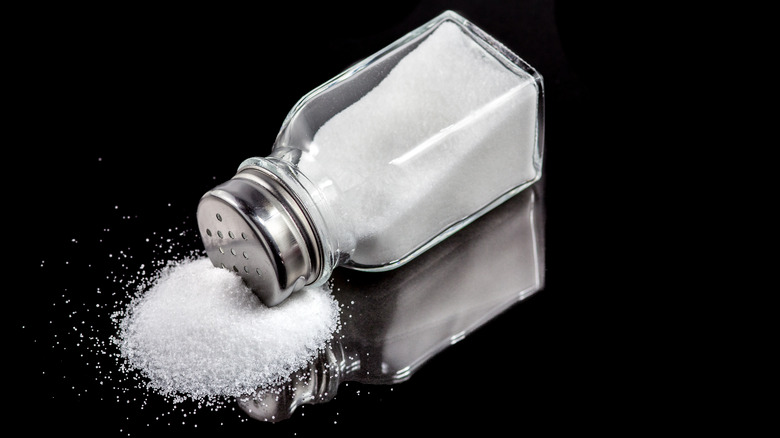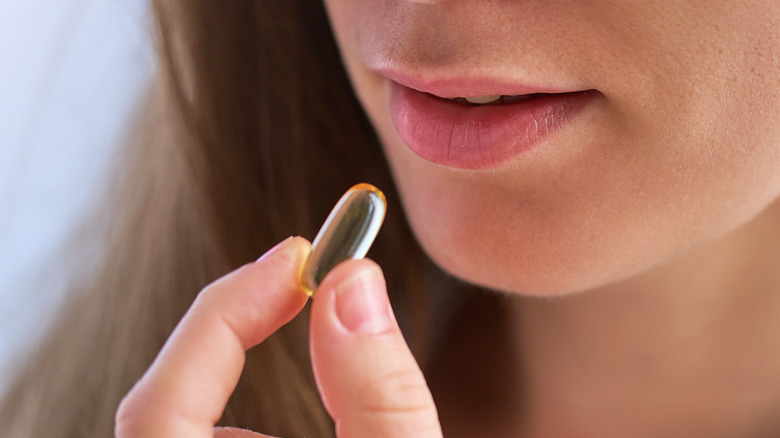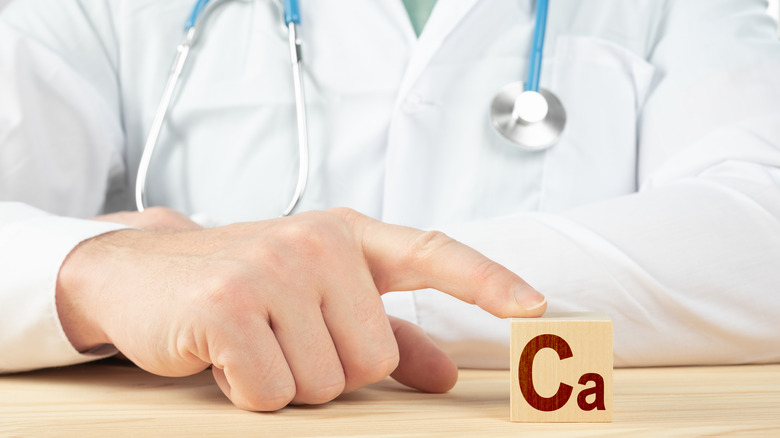Things You Didn't Realize Were Hurting Your Kidneys
Chances are you go through your everyday life not thinking very much (if at all) about your kidneys. This may be because you can't see them, unlike your hands or face. If your body was a movie, they wouldn't be in the spotlight, but rather behind the scenes as an important member of the crew. That being said, make no mistake: your kidneys are vital to your health for more reasons than you might realize.
Your kidneys' most obvious task is filtering out waste, toxins, excess fluid, and drugs from your body (via National Kidney Foundation). However, that's only the tip of the iceberg. They're also crucial for keeping your blood pressure at a healthy level, creating a key nutrient for your bones' health, and making sure your body has the right amount of red blood cells. Your kidneys have a pretty important "to-do list." Unfortunately, the list of ailments and common activities that can harm them is far longer.
This is where we come to one of the biggest concerns surrounding your kidneys: chronic kidney disease. As the National Kidney Foundation explains, when your kidneys are damaged, they cannot function as they should. This can lead to health problems, such as nerve damage, heart disease, and bone weakness. Fortunately, it is possible to avoid kidney issues if you're aware of what can harm them.
The risk of high intensity exercise
Physical activities like spin class can be a healthy part of an exercise routine. Before you sign up for one, however, you should be aware of a possible (albeit) rare disorder of the kidneys that can be brought on by excessive physical activity.
According to WebMD, rhabdomyolysis (rhabdo) is when your muscles become damaged and release an enzyme that can be damaging to your kidneys. It can even lead to kidney failure and death. The repetitive motion of a muscle and new movements can bring on rhabdo. Dr. Maureen Brogan, an associate professor of medicine at New York Medical College, wrote an article published in The American Journal of Medicine about how spin class can cause rhabdo. It can even arise in athletes who are new to cycling if they are using different muscles in ways that they aren't used to "at an intense rate."
Warning signs that you might have rhabdo include urinating less often and/or dark urine (via WebMD). You may also feel like your muscles are not only weaker, but swollen. Before trying spin, speak with your health care professional. You may want to practice on a stationary bike on your own where you can control the speed, intensity, and duration before trying a spin class.
Medications used for heartburn
If you regularly experience heartburn, any treatment that gives you relief may be worth considering. However, if you take or are looking into taking proton pump inhibitors (PPIs), you need to speak with your healthcare provider about their possible impact on your kidneys.
As MedicineNet explains, PPIs lower the amount of acid your stomach makes, which reduces the chances of developing ulcers in your stomach, esophagus, and the part of your small intestine called the duodenum. Over time, PPIs might make your kidneys swollen and lead to them working less effectively. It can even result in long-term kidney disease (via WebMD and MedicineNet). In addition, you may experience problems with your liver and pancreas, as well as fever, headaches, gas, diarrhea, constipation, nausea, and vomiting.
If you have heartburn or another stomach acid-related health concern, but you are also worried about your kidneys, you should explore different treatment options available to you (via MedicineNet and WebMD). For example, you might want to consider taking an H2 blocker instead of a PPI. Regardless of what medication you choose, keep track of possible side effects. Remember, everyone is different and can have varying reactions to certain drugs. Even if there is some trial and error, it's important to get the best possible treatment that won't harm your kidneys and other organs.
Kidney function and high blood pressure
If kidney failure had a most-wanted list, hypertension (high blood pressure) would be the number 2 culprit (via American Heart Association). Even though the kidneys are part of your excretory system, they still play a crucial role in your circulatory system by reducing the toxins and excess fluids in your blood. When your blood pressure is too high, your kidneys can suffer.
To fully understand the connection between your kidneys and your circulatory system, we need to address 2 of the smallest parts of your body: nephrons and capillaries. As the American Heart Association explains, capillaries are blood vessels that are so small, they are "hair-like." Nephrons, on the other hand, are tiny, "finger-like" filters inside of your kidneys that connect to these capillaries. For this reason, it may not be surprising that if hypertension injures your blood vessels, your nephrons might receive fewer nutrients and less oxygen. This can ultimately result in damage.
Injured kidneys may not filter your bloodstream properly, and they can make it harder to manage high blood pressure (via American Heart Association). It's your kidneys that create aldosterone, which is an important hormone when it comes to your blood pressure. If your kidneys are impaired, however, they might not be able to properly produce this hormone. This is why it's crucial to adopt a lifestyle that includes a healthy diet, exercise, and stress management to keep your blood pressure from going too high (via American Heart Association).
Positive and negative sources of stress
When we think of stress, we often only focus on unpleasant scenarios, like getting into a fight with someone we care about or losing a job. However, strong negative emotions are only one part of the possible stressors in our lives that can take a toll on our kidneys.
Before we go any further, let's clear up exactly what stress is. According to the National Kidney Foundation, both physical and psychological factors that throw off your equilibrium fall under the stress umbrella. For example, falling and getting hurt can be stressful, but so are positive aspects of our lives. For instance, being a parent can be very rewarding and life-changing, but that doesn't mean it doesn't come with worries and fears. The bottom line is that no matter what the source of stress is, it can hurt your kidneys over time.
Since it's impossible to avoid stress, the secret to reducing your chances of it impacting your kidneys is to channel and reduce it (via the National Kidney Foundation). One way is to write down what is stressing you out, along with possible steps to help you address these stressors. In addition, lifestyle changes like meditation, exercise, and yoga, as well as a healthy diet and sleeping schedule, can all help manage stress.
Strep throat and your kidneys
If you've ever had strep throat, you know that a sore throat is only one part of this bacteria-caused infection. As the Centers for Disease Control and Prevention (CDC) explains, strep throat can cause vomiting, a headache, and a rash called scarlet fever. When someone is finally feeling better after a case of strep throat, they just want to put the whole unpleasant experience behind them — but did you know that it can potentially harm your kidneys?
Known as post-streptococcal glomerulonephritis (PSGN), this ailment can develop from the bacteria that causes strep throat in your body (via the CDC). However, the bacteria itself isn't what causes PSGN — it's the fallout of your immune system defending your body from the bacteria. Because of this, PSGN is not contagious, unlike strep throat. With that said, it is possible (although not common) to experience long-term kidney damage and even kidney failure because of PSGN.
Besides damaging your kidneys, PSGN can cause your iron levels to decrease, which can leave you feeling exhausted (via CDC). In addition, it can cause swelling around the eyes, as well as in your feet and hands. Other common symptoms include urinating less often, and when you do, your urine may be a reddish-brown color. Sometimes, a person can have PSGN and have no symptoms. If you've had strep throat, speak with your healthcare provider about PSGN.
Smoking and its impact on your kidneys
When we think of health issues caused by smoking, we usually focus on the lungs. However, data shows that this habit can affect your kidneys as well, even if you've never had kidney issues in the past (via WebMD). You might not even realize anything is wrong until the damage has had a chance to progress.
A study published in the Annals of Internal Medicine looked at the kidney health of non-smokers compared to the kidneys of smokers and those who had quit smoking more than a year prior (via WebMD). By examining the participants' blood and urine, researchers determined that the current and former smokers' kidneys were not functioning normally. That being said, it's possible to have abnormally functioning kidneys and no symptoms at all.
Although data suggests that quitting smoking can help undo at least some of the damage smoking does to your kidneys, these improvements in your kidneys' function will likely be gradual (via WebMD). Plus, giving up smoking can be very difficult, especially for someone who's physically addicted to it. If you, or anyone you know, is struggling with addiction, help is available. Visit the Substance Abuse and Mental Health Services Administration (SAMHSA) website or contact SAMHSA's National Helpline at 1-800-662-HELP (4357).
Possible kidney damage from steroids
We've all seen commercials that advertise "4 out of 5 dentists" recommend a particular brand of toothpaste. Well, one study published in the American Society of Nephrology in 2009 found 9 out of 10 bodybuilders had health issues with their kidneys because they overused anabolic steroids. Stopping their steroid abuse also didn't prevent all of them from developing kidney failure.
Anabolic steroids are also called performance-enhancing drugs and anabolic-androgenic steroids (via MedlinePlus). No matter what you call them, they are the synthetic version of the hormone testosterone, which encourages muscle growth. These steroids can cause a number of health issues in both men and women, including overtaxing the kidneys to the point that they can become damaged. In fact, 1 of the 9 bodybuilders in the study experienced end-stage kidney failure, even after they stopped using steroids (via ScienceDaily). "Athletes who use anabolic steroids and the doctors caring for them need to be aware of the potentially serious risks to the kidney," said Dr. Leal Herlitz, one of the authors of the study (via ScienceDaily).
Aside from possibly damaging your kidneys, performance-enhancing drugs can cause high blood pressure, heart attacks, and liver cancer (via MedlinePlus). In addition, they can lead to infertility and baldness in men, and changes in body hair and menstrual cycles in women. These types of steroids can be addictive, and withdrawal from them can cause sleep issues, changes in appetite, depression, and even suicidal tendencies.
Colonoscopies and your kidney health
A colonoscopy is a common procedure that can lower your chances of developing colorectal cancer. That being said, you should speak with your healthcare provider about taking a laxative often used to prep for a colonoscopy, especially if you're concerned about your kidneys.
According to MedlinePlus, sodium phosphate is sometimes recommended for adults to take prior to their colonoscopy. This laxative gives the person diarrhea to at least partially clear their large intestine and bowel of waste. It isn't a pleasant thought, but occasionally necessary for a colonoscopy to be as effective as possible. However, as MedlinePlus notes, sodium phosphate can potentially cause kidney damage, and even result in death. In fact, this damage can occur anywhere from a few days to several months after the colonoscopy, and in some cases, it is irreversible.
If your healthcare provider still clears you to use sodium phosphate, make sure to flush out your system with clear liquids like water (via MedlinePlus). In addition, do not use any other products to clear out your colon, like enemas and other types of laxatives. Seek medical help as soon as possible if you start experiencing possible side effects of sodium phosphate, like urinating less often or swollen legs and feet.
The impact of type 1 and type 2 diabetes
Although we tend to think of diabetes as a single ailment, there is more than one version of it (via American Diabetes Association). Type 1 diabetes, for example, is when your body doesn't produce insulin, which is crucial for breaking down carbohydrates. Type 2 diabetes, on the other hand, is when your body doesn't properly use the insulin it produces. Whichever you may have, you run the risk of developing a condition that can severely damage your kidneys.
As the Mayo Clinic explains, diabetic nephropathy (or diabetic kidney disease) is when your kidneys' filtering system becomes damaged due to diabetes. The good news is if your healthcare provider diagnoses it in its early stages, it is treatable. If left unaddressed, however, it can cause a number of health issues, such as exhaustion, nausea, vomiting, blood pressure management issues, confusion, and swelling in various parts of your body. Beyond these symptoms, diabetic nephropathy can cause kidney failure. You may need to go on dialysis or have a kidney transplant.
Diabetic neuropathy can also cause issues with your bones (via Mayo Clinic). This is because your bone health depends on different nutrients in your blood being at the right levels. If your kidneys aren't functioning properly, those levels may be off.
Pain medications and your kidneys
Next time you're at a drug store, count how many different types of over-the-counter (OTC) painkillers there are. Then, think about how many are also available with a prescription. Certain medicines (formally known as analgesics) are very common, to the point we sometimes don't think about popping a couple of aspirin if we have a headache (via Johns Hopkins Medicine). However, these drugs can pose a danger to your kidneys.
Taking either prescription or OTC painkillers over a long period of time can lead to analgesic nephropathy, resulting in injury to the blood vessels inside of your kidneys. If this occurs, you could experience back pain, swelling, and numbness throughout your body, and might find you bruise or bleed more easily. In addition, you might become nauseous, lethargic, and exhausted. Although you might feel like you need to use the bathroom more often, you might not be able to urinate as much. When you do, you may see blood in your urine.
Because someone with analgesic nephropathy can eventually develop acute kidney failure, it's important to be careful when taking painkillers (via Johns Hopkins Medicine). These include ibuprofen, acetaminophen, aspirin, and naproxen sodium. If a medication contains more than one type of painkiller mixed with either codeine or caffeine, there's a greater chance you could develop analgesic nephropathy. Don't be afraid to ask your healthcare provider or pharmacist about exactly what's in your medication.
Medical test dye and your kidneys
The dyes used in CT scans, angiograms, and MRIs have a low chance of injuring your kidneys (via National Kidney Foundation). In fact, the 2 kidney-related conditions known to be caused by such dyes are considered rare occurrences. However, it is important to be aware of them, especially if you have kidney disease.
As the National Kidney Foundation explains, a person who receives dye for a CT scan or an angiogram can develop contrast-induced nephropathy (CIN). If this occurs, the person's kidneys will suddenly not function as well, and they might experience symptoms like itchiness, swollen ankles, and changes in appetite. Although CIN is usually temporary, there is a chance that a person who develops CIN will also experience circulatory system issues. The odds of CIN go up if you have other health problems, like chronic kidney disease or diabetes.
Aside from CIN, a person can develop a possibly life-threatening disease called nephrogenic systemic fibrosis (NSF) from the dye used during MRIs (via National Kidney Foundation). It's possible to not even realize you have NSF, as symptoms such as joint stiffness and a burning sensation on the skin can show up as late as 3 months after an MRI. Fortunately, NSF does not appear to happen to those with healthy or only slightly injured kidneys. However, if you have chronic kidney disease or acute kidney injury, you should speak with your healthcare provider.
Consuming high amounts of sodium
The "Salty Six" sounds like the title of an episode of "SpongeBob SquarePants." However, the Cleveland Clinic notes that it's actually six types of food that are loaded with salt, and not great for your kidneys.
As the Cleveland Clinic points out, your body needs your kidneys to filter your blood. This includes fluids, which are transported by your kidneys to your bladder for excretion. However, overconsumption of sodium can result in your kidneys not working as effectively, which means this fluid remains in your bloodstream. As you can imagine, this can lead to health problems like high blood pressure, which in turn can do damage to your kidneys. "If this cycle is not stopped, it can lead to kidney disease and kidney failure," hypertension specialist Dr. George Thomas told the Cleveland Clinic.
So, which foods are the "Salty Six" that can raise your sodium and damage your kidneys? Some, like pizza and canned soup, are obviously high in salt. However, others like sandwiches, which can have salty condiments, are easy to overlook. In addition, bread and rolls, as well as cured meats and cold cuts, can all raise your sodium levels. Finally, be careful about poultry and how it's prepared. As the Cleveland Clinic points out, chicken nuggets are especially high in sodium.
The consequences of too much vitamin C
From oranges to Emergen-C vitamin drinks, it's easy to find sources of vitamin C to fit into your everyday life. Vitamin C is an important nutrient that keeps your bones strong and helps your body heal from injuries (via Healthline). However, surpassing your recommended vitamin C intake can negatively impact your kidneys.
Although your kidneys help filter your bloodstream (including high levels of nutrients like vitamin C), they do have their limits (via Healthline). When you have too much vitamin C in your body, your kidneys can develop kidney stones over time. Ask anyone who has had this condition, and they'll tell you it can be painful and cause issues in the bathroom. If your kidneys are already damaged from kidney disease, upping your vitamin C intake could make a bad situation worse.
Does this mean you should limit vitamin C in your diet if you have kidney issues? As Healthline explains, you're more likely to increase your vitamin C levels by taking too many vitamin C supplements, rather than by eating and drinking vitamin C-rich foods. Plus, you do need a certain amount of vitamin C, especially if you have chronic kidney disease. With that said, keep track of your diet and supplements, and speak with your healthcare provider to make sure you're not overdoing your vitamin C intake.
Calcium and kidney health
Before you throw out your milk or multivitamin, keep in mind that calcium is important for your health — in the right amounts. Like many nutrients, too much of a good thing can be bad. In this case, it may not only impact your kidneys, but also your heart, muscles, digestive system, and bones (via Mayo Clinic).
When you have too much calcium circulating in your body, you can develop a condition known as hypercalcemia (via Mayo Clinic). This is because of overactive glands located in your neck. However, you can also become hypercalcemic if you overdo it when it comes to vitamin D and calcium supplements. While your kidneys help filter out excess calcium, high levels of this mineral can tax your kidneys and lead to kidney stones.
If large amounts of calcium are hurting your kidneys, you might become thirsty all the time and make more frequent bathroom visits (via Mayo Clinic). You also might experience pain in your abdomen and stomach, especially if excess calcium affects your digestive system. Hypercalcemia can impact your brain, making you feel tired and depressed. In addition, it can cause vomiting and constipation, weakness in your muscles, pain in your bones, and even issues like cardiac arrhythmia. However, it is possible to have hypercalcemia and not have any symptoms at all. If you're concerned about your calcium levels, speak with your healthcare provider right away.

